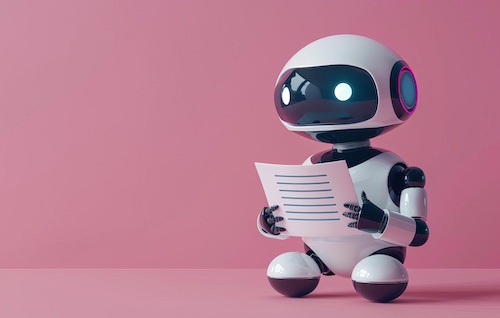Key points:
- There is a pressing need to increase parental involvement in AI discussions
- Parents are cautiously optimistic about AI in schools
- When it comes to AI use, educators are more comfortable than students
- For more news on AI in education, visit eSN’s Digital Learning hub
Parents of Gen Alpha and Gen Z students are optimistic about the potential of artificial intelligence (AI) to enhance various aspects of education, according to a new Morning Consult survey commissioned by Samsung Solve for Tomorrow.
The survey notes that an overwhelming 88 percent of parents believe that knowledge of AI will be crucial in their child’s future education and career. However, despite this belief, 81 percent of parents either don’t believe or are not sure that AI is even part of their children’s curriculum. That disparity highlights a pressing need to raise awareness of and increase parental involvement in AI discussions, and advance the implementation of AI in American primary and secondary education.
“Our survey underscores the importance of narrowing the AI gap in education by equipping students, educators, and parents with the knowledge and tools they need to navigate the impact of this transformative technology,” said Ann Woo, Head of Corporate Citizenship for Samsung North America.
This new survey by Samsung Solve for Tomorrow was sparked by the increasing use of AI in the innovative community solutions submitted by school teams to our annual public school STEM competition. The findings point to an urgent need to ramp up student education and teacher professional development to better prepare students for future success.
Key findings:
- Emphasizing the importance of AI knowledge: Beyond the core finding that 88 percent of Gen Alpha and Gen Z parents see AI knowledge as essential for children’s education and eventual careers, 89 percent believe that it is vital for the next generation to play an active role in shaping the development and use of AI. And 84 percent consider it important or very important to offer teachers extra training on how to incorporate AI into the classroom.
- Tapping into AI’s potential in education: A significant majority of parents (69 percent) are optimistic that AI has the potential to significantly advance education and learning. Seventy-six percent see AI’s greatest opportunity in education as assisting with content creation. Other notable applications include answering students’ questions (72 percent), simulating real-world scenarios (70 percent), and offering personalized learning experiences (67 percent).
- Enhancing educational experiences: Among the 19 percent of parents who report that AI is already being used in their child’s curriculum (40 percent are unsure and 41 percent state AI is not being used), applications cited as significantly enhancing education are: AI-powered educational games or simulations (89 percent), content creation tools (88 percent), and chatbots or virtual assistants (83 percent).
- Growing interest in AI tools: Approximately 42 percent of Gen Alpha and Gen Z parents say their child is interested in specific AI tools, with Generative AI (62 percent), Robotics (49 percent), and Computer Vision (44 percent) leading the way.
Woo elaborated, “The responses indicate that perceptions of AI can vary based on parents’ familiarity with the technology, and in some cases, the type of community they are in. To prevent disparities in AI access and ensure the next generation can use AI responsibly and effectively, it’s essential that all those involved in children’s education are well-informed as AI becomes increasingly integrated into learning environments and STEM initiatives like Samsung Solve for Tomorrow.”
Balancing optimism with caution: Despite overwhelming optimism parents voiced about AI’s benefits, they are also aware of the challenges and potential downsides of AI integration in education. The survey indicates that 70 percent believe it’s essential to have guidelines for AI education. Ninety-two percent emphasize the importance of educating students about AI’s potential negative impacts and 91 percent feel they should be fully informed about the use of AI in their child’s school.
Parents also expressed concerns about dependence on AI, including the potential for a lack of human interaction (56 percent), negative impacts on critical thinking skills (48 percent), and the risk of students using AI to cheat (48 percent). Additionally, 84 percent of parents believe it is important to prioritize teaching AI ethics and responsible use alongside technical skills.
Harnessing AI for community challenges: Samsung Solve for Tomorrow is a national competition that fosters innovation among U.S. public middle and high school students. Emphasizing problem-based learning (PBL), social impact entrepreneurship, and environmental sustainability, it challenges them to explore the transformative potential of STEM in addressing significant issues within their local communities.
Three impressive AI-driven STEM solutions from the most recent 2023-2024 competition have garnered widespread attention, helping spread awareness of AI’s positive contributions in tackling real-world issues:
- Students in New York’s Stuyvesant High School created an app and cane that use AI and tactile feedback technology to enhance mobility and awareness for visually impaired individuals to navigate the streets with confidence.
- The student team from Colorado’s STEM School Highlands Ranch developed an AI-powered wildlife detection system to reduce the state’s high rate of wildlife-related automobile collisions.
- Princeton High School students in New Jersey integrated generative AI into a plush robot designed to teach and preserve endangered Indigenous languages.
The 2024-2025 STEM competition is currently accepting entries through Thursday, October 24, 2024, please visit Samsung.com/solve.
This press release originally appeared online.
- Most parents know AI will be crucial to their children’s future - October 15, 2024
- Use of Technology in the Classroom to Enhance Teaching and Learning - September 26, 2024
- How Does Technology in the Classroom Help Teachers? - September 26, 2024


